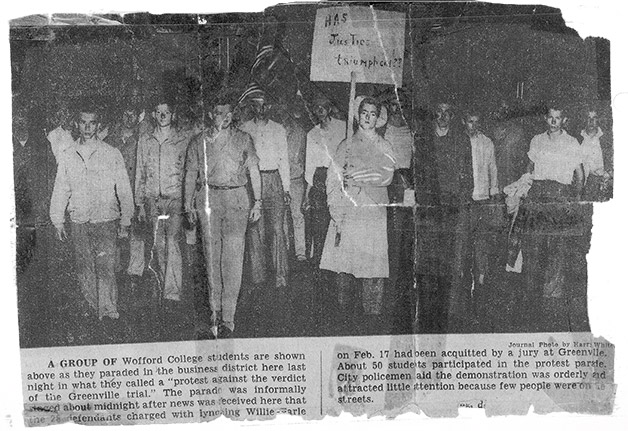In February, Wofford hosted a conference on South Carolina's last lynching, the subsequent trial, a courageous sermon and the continuing challenge of preaching to confront racism. The event featured the insights of Dr. Will Willimon ’68, a retired United Methodist bishop, and Dr. Will Gravely ’61, professor emeritus at the University of Denver and a scholar on the Willie Earle lynching and trial. The event also launched the book "Who Lynched Willie Earle: Preaching to Confront Racism," written by Willimon.
“The evening before the seminar, students from my class and a few other Wofford students had dinner with Bishop Willimon and Dr. Gravely,” says the Rev. Ron Robinson ’78, Perkins Prothro Chaplain and Professor of Religion. Robinson helped organize the seminar with the support of the United Methodist Church and campus leaders. “It was then that Dr. Gravely shared with us a photograph of Wofford students from 1947 that showed them protesting the verdict of the Greenville trial.”
After the dinner, Robinson discovered that the historical marker, erected in 2010 to remember Earle, had been stolen. He shared the information with Wofford's Campus Union assembly, and current Wofford students responded.
“Replacing this marker is a concrete action that says that we will neither ignore nor cover up nor deny events like the Willie Earle lynching and trial. It connects the students of 2017 with those who spoke out in 1947,” says Robinson.
“After hearing Rev. Ron tell Willie Earle’s story and the story of the Wofford students that protested the injustices that took place, I thought that this was an excellent opportunity for our community to come full circle some 70 years later to do the right thing,” says Drake McCormick ’18, president of Campus Union. “I think there is power and more meaning when a large group of people from many different backgrounds get together for a common good. Standing up for what we believe and voicing what we know to be right, whether that be through protesting a wrong or through funding a state historical marker to serve as a symbol for where we have come and where we need to continue to go. ... It’s the Wofford way.”
Now that the funds have been raised, Robinson and Campus Union are working to build a team that will design the new marker and organize its installation and preservation.
The lynching of Willie Earle took place in Greenville, S.C., on Feb. 17, 1947, when Earle, a 24-year-old black man, was arrested in the robbery and murder of a Greenville cab driver named Thomas Watson Brown. Based on circumstantial evidence, Earle was charged in the murder and arrested. A convoy of taxi drivers drove to the jail, forcibly procured Earle’s release and beat, stabbed and shot him to death in what is considered the last racially motivated lynching to occur in South Carolina. The trial, which gained national media attention, resulted in the acquittal of 31 white men who had been charged with Earle’s murder.
“Our college’s history with race often has been difficult, at times heartening and frequently complex,” says Robinson. “It seems to me that being involved in this project will give us an opportunity to think about not only our history, but also about race today and who we want to be as members of society.”
By Omar K. Elmore '19
